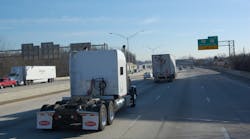The ongoing driver shortage along with the impact of hours of service (HOS) changes made by the Federal Motor Carrier Safety Administration (FMCSA) last July remain the dominant concerns facing carriers and are expected to remain so for some time to come, according to research conducted by the American Transportation Research Institute (ATRI).
In a conference call with reporters arranged by Wall Street investment firm Stifel Nicolaus & Co. last week, Rebecca Brewster, ATRI’s president & COO, noted that when the group analyzed just carrier responses to the 2013 edition of its annual “top ten industry issues” survey, the driver shortage and HOS changes were ranked as the most pressing worries.
As a result of those findings, Brewster said ATRI has two new studies underway: one designed to dig into how the industry compensates drivers and another on the demographics of the truck driver population.
“Looking at the breakdown of truck driver age groups is already showing a very steep curve toward old drivers,” she explained to Fleet Owner. “There’s no longer enough in the younger age groups to ‘backfill’ the demographic as older drivers retire. So this study is going to long into how we need to go about filling the truck driver seat ads the numbers are really frightening as to the lack of the youngest age groups entering this industry.”
Specific “fallout” from the HOS changes made last July is also becoming more apparent, according to ATRI’s research. Brewster said a loss of 7.5 minutes to 30 minutes per week per driver due to the rule changes is costing the industry an additional $95.06 million to $376.94 million, as well as a net loss of $1.6 billion in driver compensation, based on the group’s close analysis of 40,000-plus driver logbooks.
Surveys of drivers by ATRI also highlighted a broad dislike of the rule changes from many perspectives, she added. For starters, 27.8% reported they are more fatigued as a result of the rule changes, 38.5% said somewhat more fatigued, while 1.2% reported being more rested. Another 67.4% of drivers polled by the group said their pay has declined due to HOS changes, with only 0.8% reporting pay increases.
Finally, 49% reported a “very negative” impact on their quality of life from the rule changes, with 33.5% dubbing the impact “somewhat negative” and just 2.2% terming it “very positive.”
ATRI also found that 80.1% of carriers it surveyed said they’ve lost productivity die to the HOS changes, with 49.9% noting that they now require more drivers to maintain the same “status quo” in terms of freight-hauling capacity, while 22.7% said they’ve raised driver pay to help offset the impact of productivity losses.
Brewster also noted that ATRI is now preparing what she called a “third round” of data collection on the impact of HOS changes on the trucking industry to both carriers and drivers alike.



